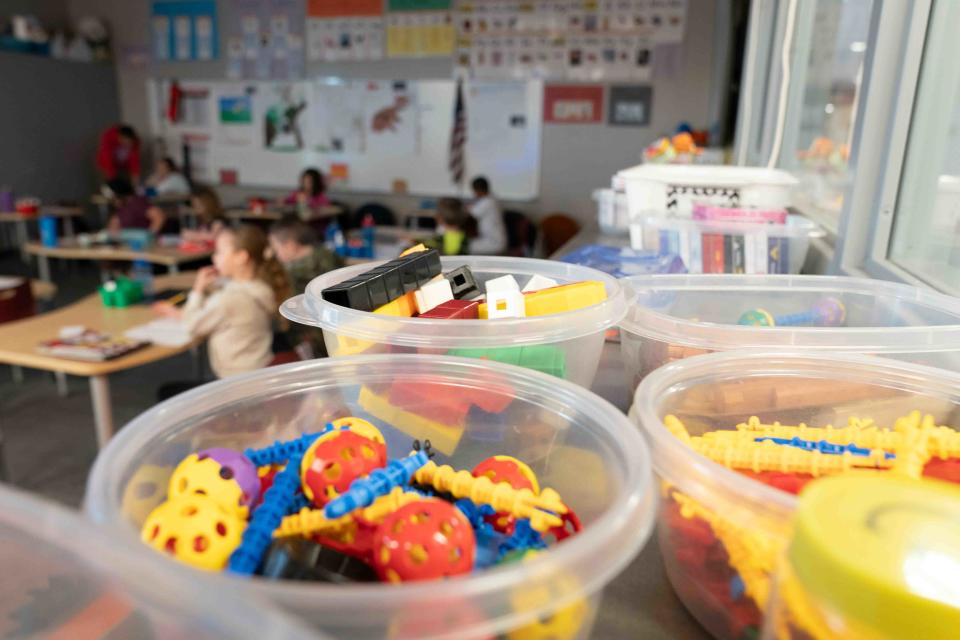How increased state funding for special education will help two schools in Topeka USD 501
Schools across Kansas can now hire more education specialists and address the needs of special education programs.
In a bipartisan effort, Kansas legislators increased funding for special education by $75 million.
This extra funding will be used across the state to give resources to special education programs, including the Jardine schools, which has one of the largest special education programs in Topeka 501 Public Schools.
Roughly one in four students at Jardine Elementary and Middle School have an individualized education program, Jardine Elementary principal Angela Pomroy said. An IEP is a document outlining extra educational accommodations for a special education student.
IEPs can be applied for a large array of needs including behavioral, mental health and accommodations. When an IEP is created, a school is legally required by the federal government to provide the listed accommodations.

Jardine elementary and middle schools have struggled with funding
Between Jardine's elementary and middle school, the special education program is one of the largest in the area, Pomroy said.
Jardine special education director Jennifer Harrington said the program's largest hurdle is recruiting special education providers.
"We're not only just competing with other school districts, we're competing with the medical field as well," Harrington said. "So in order for our students to have high-quality services, we have to be able to recruit and retain staff."
Harrington said the medical field provides work year-round instead of nine and a half months like schools. Because of that, she said schools have to be more competitive with their salaries.
To fully function, the school needs psychologists, speech pathologists, social workers, physical therapists and other providers for special education, she said.
"Right now, I think it's just the overall shortage of people even going into the field, which makes it even more challenging," Harrington said.
Because Jardine has struggled to find special educators, some of the needed positions have been filled by contacting out services, which costs a lot more, Harrington said.

Special education teacher Meredith Royston said she feels and sees the restraints of lower funding.
"Our SPED population is pretty large, and we are in a large school," Royston said. "I see that need from those gen-ed teachers on a daily basis, they just need more help. Because I mean, they have 25 kids in a class. So, just even having an extra adult in there is very beneficial for them."
Royston said it's difficult to see students struggling.
"It hurts my heart a little bit," Royston said. "My husband is also a teacher here. My child is in kindergarten in 501. So, it is a reflection in my life on a daily basis. So, I just I think that was more funding, we can do a whole lot better. We're doing the best we can now.
"I definitely think that and there's some really great things happening every day that I see from these teachers that put their heart and soul into into these kids every day. But I think we can still do better with more funding."
Jardine provides care to private and parochial school youths with IEPs
Another added pressure to Jardine's special education program is the amount of people they provide aid to, Pomroy said.
Harrington said they don't provide care to only the students attending Jardine, but they provide care for any child in need of an IEP within their school boundaries.
Along with Jardine students, the program provides care for any private and parochial student in the area and Shawnee County Juvenile Detention Center youths who have an IEP.
That increases the school's count by an additional 190 youths a year.
Pomroy said because providing the care outlined in IEPs is required, sometimes the school had to take money out of the general fund to address special education needs.
With the added funding in the budget, some general fund money can return to its original purpose, including providing extra care or maintenance for the school as a whole, Pomroy said.

Legislature increased school funding overall and for special education
The increased funding was passed from Senate Bill 387. The House voted 115-2 and the Senate voted 35-2 on April 26. The bill provided $303 million in new school funding, including the $75 million for special education.
How the $75 million will be spent will be decided by the Kansas State Board of Education.
Topeka USD 501 leaders say they're grateful for legislative action
Topeka Public Schools general director of instructional services Aarion Gray said superintendent Tiffany Anderson and several principals are writing personal letters to each legislative member to express gratitude for the additional investment.
"We are so grateful for the action of our legislators and for the ongoing support of parents and staff who have shared the positive impact of the added funding with our legislators," Anderson said.
Gray said the funds will help about 3,300 special education students in Topeka USD 501.
"The positive impact of the recent action taken by the Kansas Legislature through SB 387 will be felt by school districts across Kansas," Anderson said in a written statement. "An investment in special education funding benefits all students because it reduces funds from being taken from areas impacting general education students, which have historically been used to close the gap to meet requirements of special education."
This article originally appeared on Topeka Capital-Journal: How special education funding rise will help schools in Topeka USD 501

